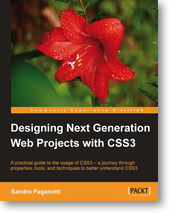Archive for the ‘Librerie’ Category
Sunday, August 21st, 2016
This is, by far, my longest running side project. I’ve started it before moving to London, so around December 2014 and now I’m so proud to announce it is ready and released on GitHub.
(more…)
Posted in Librerie | Comments Off on Enabling browser BPG support using Service Worker
Saturday, March 1st, 2014
Angular.js does an excellent job on preventing a form submission when invalid but only if the action attribute is not present, otherwise we have to implement a few tricks to achieve the same behaviour.
(more…)
Tags: angular.js, submit
Posted in Algoritmi, Librerie | Comments Off on Angular.js prevent an invalid form submission
Sunday, June 2nd, 2013
Types is a very well made WordpPress plugin that basically allows the creation of new custom post types and custom fields directly from the WordPress administration area without the need to write extra PHP code.
(more…)
Posted in Librerie | Comments Off on How to extend WordPress Types Plugin and create new field types
Friday, March 23rd, 2012
I was asked to create a website where some content can be viewed only by registered users. I decided to go for WordPress and I choose wp-members plugin to enable member-only content as well as custom login and register pages.
(more…)
Tags: Wordpress, wp-members, WPML
Posted in Librerie | Comments Off on Translating wp-members with WPML
Thursday, November 25th, 2010
The idea behind this project was in my head since a while. Then thanks to Gregory Brown and his Ruby Mendicant University, I had the opportunity and the incentive to start developing it. Ruby Spell Doctor bind some of the most useful Hunspell functions making them available to Ruby developers. For who don’t know, Hunspell is a widely used open source syntax checker library that is implemented in a lot of softwares, such as OpenOffice, Google Chrome and Mac OSX.
(more…)
Tags: Hunspell, Ruby Mendicant University
Posted in Librerie | Comments Off on Ruby Spell Doctor: a Ruby binding to Hunspell
Sunday, February 28th, 2010
Ho recentemente acquistato un libro che mi stà regalando una serie di spunti per interessanti approfondimenti e delle simpatiche occasioni per scrivere due righe di codice. Il libro in questione si chiama “Enigmi e giochi matematici” di Martin Gardner e raccoglie gli articoli che lo stesso Martin pubblicò negli anni sulla rivista Scientific American.
(more…)
Tags: abacus, Hérigone, mnemotecnica
Posted in Librerie | Comments Off on Abacus, Pierre Hérigone e la mnemotecnica
Wednesday, February 3rd, 2010
Update, 05/02/10: Ecco il link alle slide della presentazione! Ringrazio tutti i partecipanti alla bellissima serata!
Il prossimo giovedì (4 febbraio 2010) terrò un Lightning Talk al Ruby Social Club su alcuni strumenti interessanti che orbitano attorno al concetto di Natural Language Generation/Parsing. In particolare vedremo due librerie che consentono di interfacciarsi con WordNet e Link-Grammar.
Non voglio svelare nulla dello speech in questo post (anche se sicuramente venerdi farò un update allegando le slide della presentazione) ma solamente fornire a coloro che lo ritengano utile le istruzioni su come installare tali librerie sul proprio Mac.
(more…)
Tags: linguistics, link parser, link-grammar, natural language generator, natural language parser, wordnet
Posted in Librerie | Comments Off on Ruby linguistic, Wordnet e LinkParser su Snow Leopard
Tuesday, December 8th, 2009
Tutto è nato da una bellissima presentazione che ho seguito ormai quasi un anno fa: si parla dell’Euruko 2009 in quel di Barcellona; lo speech in oggetto si intitolava ‘Fun with ruby (and without r***s). Program your own games with gosu‘ e trattava di una libreria per lo sviluppo di giochi scritta in Ruby chiamata Gosu.
(more…)
Tags: Gosu, multiplayer
Posted in Algoritmi, Librerie | Comments Off on Ruby e Gosu: un multiplayer a schermo condiviso
Monday, November 16th, 2009
Dal 19 ottobre i nightly builds di Webkit (e anche di Firefox credo) offrono il supporto per le interessantissime estensioni Javascript WebGL. Da quanto ho appreso nel tutorial sembra che il set di API ricalchi abbastanza fedelmente quello delle note OpenGL ES 2.0.
(more…)
Tags: OpenGL, WebGL
Posted in Librerie | Comments Off on Prime prove con WebKit e WebGL
Sunday, June 7th, 2009
Update – 18/06 : ieri sera ho tenuto una presentazione su questo tema al Ruby Social Club: ne approfitto quindi per aggiornare questo post con il link alle slide che ho utilizzato.
Negli ultimi mesi sono emerse le prime applicazioni che fanno uso di algoritmi di riconoscimento oggetti e, più specificatamente, volti. Cito, ad esempio, Picasa ed il filtro per visionare solo le facce in Google Images ma la lista di chi ha deciso di incorporare al suo interno questa funzionalità è decisamente più lunga.
Mi sono interessato subito al lato tecnico di questa nuova feature (grazie anche ad un ottimo speech ascoltato all’Erukuo 2009) imbattendomi in un particolare classificatore chiamato ‘cascade of boosted classifiers working with haar-like features’ che funziona nel seguente modo:
(more…)
Tags: HaarClassifier, OpenCV, Riconoscimento Facciale
Posted in Algoritmi, Librerie | Comments Off on Face recognition con Ruby e OpenCV
